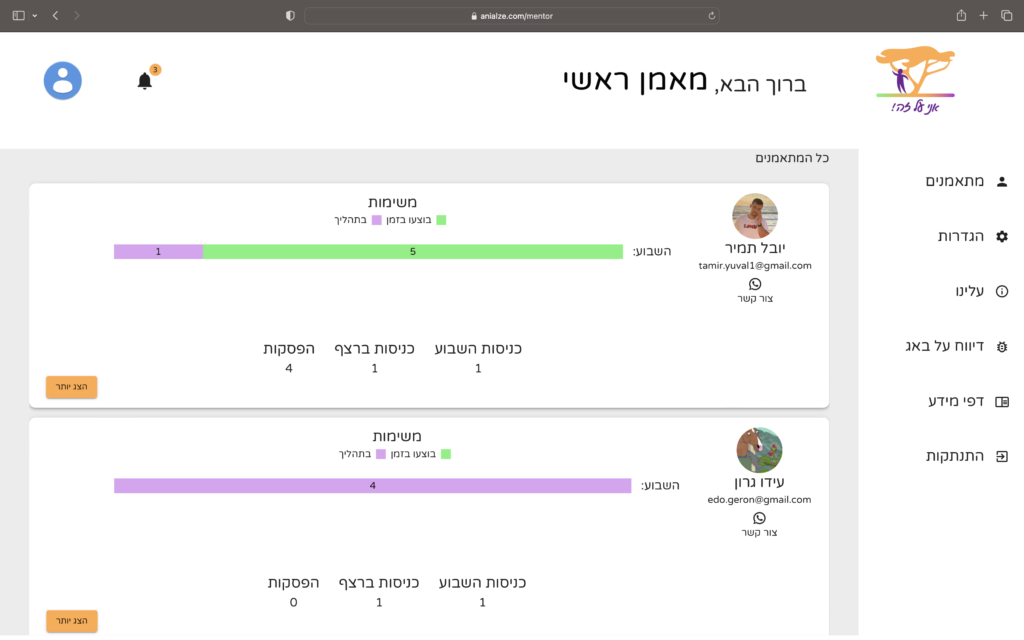Israeli military veterans and other sufferers of post-traumatic stress disorder (PTSD) will soon be able to receive online assistance in addressing a symptom that is often overlooked: chronic procrastination or an ongoing inability to follow through on a goal in their lives.
The new “Ani Al Ze” (Hebrew for “I’m on it”) website will help PTSD sufferers combat procrastination and remain consistent in pursuing their goals.

The website is for now being exclusively offered by NATAL, an Israeli non-profit organization that treats citizens suffering from war- and terror-related trauma, which is to provide the new service as part of its six-month vocational training program.
The website is already being piloted, and it will expand to reach more people in need in the coming months.
More on this subject:
In First, Israeli Study Of IDF Veterans Shows Oxygen Therapy Reduces PTSD Symptoms
IDF Veteran’s Best Friend: Dogs Ease Pain Of PTSD
Simple Saliva Test Could Help Diagnose PTSD In Soldiers
Shaked Arieli, head of Career Development at NATAL, says that she is unaware of an app or website that has been designed thus far to help people with PTSD combat their chronic procrastination.
She says that the closest digital help for PTSD she has found has been a US-developed app for American veterans that helps them understand and manage their symptoms.
While the website is currently only available in Hebrew, Arieli hopes that it will be expanded into a global service.
The Israel Defense Forces does offer a range of PTSD treatments for its soldiers, but does not offer digital assistance.

Participants of the NATAL program meet regularly with trained career coaches to strengthen their soft skills (personal attributes that let someone interact effectively), such as time management and emotional regulation, and build a personal career path that includes setting achievable short-term and long-term goals.
Digital Development
The new platform lets the participants add goals and set difficulty levels for each one, track the progress they’ve made on a particular goal, and maintain communication with their career coach between meetings.
The coaches can use the website to view the progress the participants say they have made on their goals, including verifying how often they logged on, and also provide them feedback through the WhatsApp instant messaging service.
The participants also receive daily automated WhatsApp reminders to log their progress, as well as reinforcements with custom messages and notifications.
“Our coaches work with the participants on the things that challenge them most in terms of their career progression – like time management, decision-making, and emotional regulation,” Arieli tells NoCamels.
Sign up for our free weekly newsletter
Subscribe“What we wanted to do was integrate an app into the coaching process that would help them with this,” she says.

The website was created through Code for Israel, an initiative in which hundreds of Israelis working in the high-tech sector volunteer to develop technological projects that benefit the country’s society.
A team of 15 people spent nine months carefully constructing the website, including two volunteer veterans from NATAL who previously benefited from its therapy and career coaching services.
Based on the volunteer veterans’ first-hand experience with PTSD, the team also included a feature that allows the participant to ping their career coach on WhatsApp if they are in need of urgent assistance.
And if they’re experiencing a particularly stressful day or week, participants can use the website’s “stop all” feature, which pauses all of their tasks and ceases to send them notifications until they choose to resume the process. It also notifies their career coach that they have used the feature.

“The day-to-day life of a person struggling with PTSD is very stressful, and we don’t want to overwhelm them,” says Yuval Tamir, a software engineer at cloud-computing company Zadara, who acted as project manager during the development of the website.
“The goal of the app is to help [the participants] complete these tasks, no matter how long it takes,” Tamir tells NoCamels.
Triggers And Trauma
For many people struggling with PTSD, procrastination may occur when certain parts of a traumatic memory that have not been fully processed are unconsciously triggered, according to registered practitioner psychologist Gemma Pearson.
Arieli, who has worked with many people suffering from PTSD, says that many of her clients share the same attributes of low self-esteem, fear of failure, shame, anger, and helplessness. These traits – specifically fear of failure and low self-esteem – have also been linked to causing procrastination.

Arieli believes that the website can extend beyond use by participants within NATAL. She sees it as having the potential to work with other non-governmental organizations in the rest of the world whose focus is coaching young adults with PTSD.
“This is not just another task management app – there are thousands of those in the world,” Arieli says.
“It feels like someone is helping guide people struggling with PTSD through the most daunting aspects of their goals. Even if the coach is not there all the time, the fact that they know their coach can see what they do on the website makes completing a task more meaningful,” she says.
Related posts

Editors’ & Readers’ Choice: 10 Favorite NoCamels Articles

Forward Facing: What Does The Future Hold For Israeli High-Tech?

Impact Innovation: Israeli Startups That Could Shape Our Future




Facebook comments